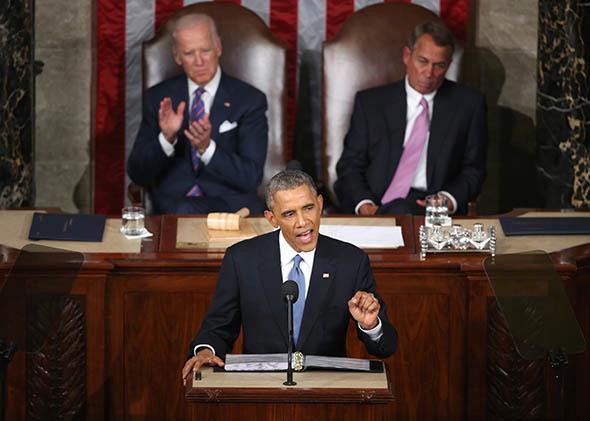In such a strong, forthright speech as President Obama’s next-to-last State of the Union address Tuesday night, it shouldn’t be a surprise that the foreign policy section was both the shortest and the slightest.
The domestic issues that he stressed for three-quarters of the speech—and that drew the heartiest applause from fellow Democrats and telling hand-sitting from Republicans—stoke fires of urgency in our daily lives and highlight our deepest ideological divides. By contrast, international politics these days are a muddle, and America’s role and influence in the world—its vision of the national interest—are muddled, too.
Obama noted that “our combat mission in Afghanistan is over,” but he did not note the continued—and extended—presence of U.S. troops in that country, and in Iraq, or the vagueness of their ultimate mission or purpose.
He issued wise principles for a post-Cold War foreign policy: not to “make rash decisions, reacting to the headlines” or sending in troops as “the first response to a challenge,” but rather to “combine military power with strong diplomacy” and to “leverage our power with coalition building.”
But in the world’s tensest conflicts, where Obama has committed American power, diplomacy, and solidarity, the results have been uneven, as has been his fidelity to those principles. It’s true, as he proclaimed, that American leadership and air power are “stopping” the advances of ISIS jihadists in Iraq and Syria, and that’s no small achievement. But his ultimate aim in those countries (“the broader strategy” that he said he’s pursuing “for a safer, more prosperous world”) is baffling. Again, this is no surprise: He’s battling the extremists of ISIS, while advocating the ouster of Syrian President Bashar al-Assad, who’s also battling ISIS; he also says he’s “supporting a moderate opposition in Syria,” while standing by as Assad mows down its fledgling fighters. There is no clear strategy here, only a holding action. And his “broad coalition, including Arab nations,” is faltering because the interests of some of those Arab nations differ so markedly from our own.
He touted another principle—“bigger nations can’t bully the small”—that he said he’s upheld in supporting Ukraine’s resistance to Russian aggression. And it is a nice touch that President Vladimir Putin, admired by so many Republicans last year for his supposedly “masterful” strategy, now stands isolated, his economy in tatters, due in part to the West’s unity in imposing sanctions (though tanking oil prices played a bigger role). But these words ring hollow when one scans the globe and sees still deadlier brutality in Syria and Egypt, and throughout much of Africa—which the United States does little to halt, mainly because it can do little.
Looking at modern-day quandaries, Obama made a firm plea for Congress to pass legislation to “meet the evolving threat of cyberattacks.” Capitol Hill and past administrations have dodged this issue for more than a decade. But it would have been better, or at least more dramatic, had he addressed the reason for this evasion—that the corporations most vulnerable to foreign hackers have blocked efforts to set mandatory cybersecurity standards and refused to spend the money to fix the problems themselves.
It would also be a good idea, at some point, for a president to acknowledge that the United States has engaged in some of the same hacking as the Russians, Chinese, Iranians, and others. We don’t hack the same sorts of targets—we don’t need to steal their industrial secrets—but it’s time for the leading cyber-countries to negotiate “rules of the road,” a cyber-age Geneva Convention, so that in some future crisis a harebrained threat to turn out all the lights in Chicago, as a way of gaining leverage, doesn’t escalate uncontrollably into an all-out cyberwar.
The other foreign-policy pieces of the speech made eminent sense. Ending the embargo of Cuba is a no-brainer, and would have widely been seen as such 30 years ago if not for Florida’s electoral votes. The ongoing negotiations with Iran might not succeed, but they’ve achieved amazing results so far—“we’ve halted the progress of its nuclear program and reduced its stockpile of nuclear material,” Obama rightly said—and to pass new sanctions now, as even some congressional Democrats have proposed, would “all but guarantee that diplomacy fails.” For that reason, Obama said he would veto a new sanctions bill—a threat that inspired only tepid applause.
Obama’s well-reasoned case for shutting down Gitmo—“a prison that the world condemns and terrorists use to recruit”—drew an eerie silence. Even his boast of prohibiting torture—a step that George W. Bush took, de facto, in the last two years of his presidency—prompted only light applause. (Where was your standing ovation when the nation needed it, Sen. John McCain?)
This is the depressing part of American foreign policy. Congress has a stranglehold on certain key issues, especially when the president needs funding to carry out an initiative—and today’s Congress is remarkably provincial and reflexively hawkish. No wonder Obama gave foreign policy such scant attention in this otherwise remarkable address. The problem, though, is that, as Trotsky once said of war, you may not be interested in the world, but the world is interested in you.
